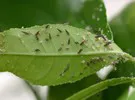 For the first time, an Asian citrus psyllid (ACP) carrying the bacteria which causes huanglongbing (HLB) was found in a commercial grove in Riverside County. While the discovery has prompted concern, University of California Riverside Extension Specialist Monique Rivera said that the find has been expected and is not all that surprising.
For the first time, an Asian citrus psyllid (ACP) carrying the bacteria which causes huanglongbing (HLB) was found in a commercial grove in Riverside County. While the discovery has prompted concern, University of California Riverside Extension Specialist Monique Rivera said that the find has been expected and is not all that surprising.
“We’ve had positive trees removed here in Riverside, and we’re not that far from LA. Eventually those two quarantine circles are likely to merge here in Southern California,” Rivera explained in an interview with AgNet West reporter Brian German. “So while it seems like a really big deal, in terms of the news cycle, I would say that this is not a surprising development, and I think we can expect to see more of it if there is more sampling done in commercial groves.”
Staff from the California Department of Food and Agriculture (CDFA) are following the ACP/HLB Action Plan to address the discovery. Rivera said she believes the ACP find could have happened sooner, but the emphasis had been on backyard trees instead of commercial operations. “I would say that the reason why maybe we haven’t seen this already is because CDFA is mostly responsible for sampling in backyards. So, they aren’t looking directly or systematically at commercial groves,” she said.
For the full story on CitrusIndustry, please click here.
